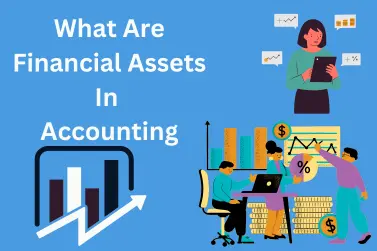What Are Financial Assets In Accounting With Definition & Examples

Here is a comprehensive guide about financial assets in which you will learn about the various investment instruments, and what are the importance of financial assets in a company or a business.
What Are Financial Assets In Accounting
Financial assets are non-physical assets and their values are derived from contractual claims such as bank deposits, bonds, stocks, and shares. These assets are valued at the market price or actual value.
Financial assets are reflected on the bases of supply and demand in the market where they are traded. Stocks and derivatives are the form of financial assets that are considered the riskiest financial instruments because their market value always fluctuates.
What Are The Characteristics Of Financial Assets
Following are the 10 characteristics of the financial assets:
- Easy convert into cash
- Normally these assets are held for 1 year
- Not necessary to have physical existence
- Valued at market price
- Changes as per demand and supply
- Easy to transfer the ownership
- They are flexible in terms of trading
- They are risky but rewarding as well
- These assets are legally recognized
- They have a standard format, etc.
Examples Of Financial Assets
Here is the list of the most popular examples of financial assets:
- Bonds
- Stocks
- Certificate Of Deposit
- Bank Deposit
- Loans
- Cash
- Notes
- Currencies
- Cash Equivalents
- Mutual Funds
- Treasury Bills
- Commercial Papers
- Repurchase Agreements
- Options Contracts
- Swap Contracts
- Annuities
- Future Contracts, etc.
Importance Of Financial Assets
Financial assets play a strong role in building a business and making it more successful. Some of the most important benefits that a business can get by using financial assets:
- These assets are the stairs of wealth creation in the form of interest and dividend income
- It helps a business to diversify the risk by investing in different asset classes
- Financial assets help in allocating the capital
- They play a vital role in the settlement of short-term debts
- Enjoy a high profit in a short time, etc.
Financial Assets FAQs
What are financial instruments?
The monetary contract is done between parties and can be created, traded, settled, and modified. Financial instruments such as bonds, certificates of deposit, and stocks.
Are financial assets liquid?
Yeah, these assets are easy to convert into cash, so they are termed as more liquid assets.
What are financial assets held for trading?
These financial assets that are held for the purpose of selling within a year are said to be financial assets held for trading.
What are financial assets at fair value?
The market value of the asset at the time of exchange is the fair value.
What are financial assets measured at amortized cost?
Financial assets are amortized when the asset is held for contractual cash flow or the payment is made on the bases of principal and interest.
What are the 4 types of financial assets?
The most common 4 types of financial assets are bonds, stocks, bank deposits, and loans.
What are considered financial assets?
Notes, bonds, stocks, currencies, and bank deposits are the common types of financial assets.
What are non-financial assets?
Assets that cannot be traded in the financial market or the value of these assets are determined by the physical net worth instead of the contractual claim.
Can financial assets be depreciated?
Financial assets are not depreciated but they can be amortized if certain conditions are met.
What financial assets carry the most risk?
Stocks and derivatives are the riskiest financial assets because their values are changed according to time and market.
Is money a financial asset?
Yeah, money is an example of a financial asset.
What are financial assets on a balance sheet?
Financial assets can be current or non-current assets as per their expected realization during the business cycle.
Is cash a real or financial asset?
Cash is an example financial asset.
What are real or financial assets?
Real assets such as real estate or commodities while the financial assets are cash, bonds, and stocks.
